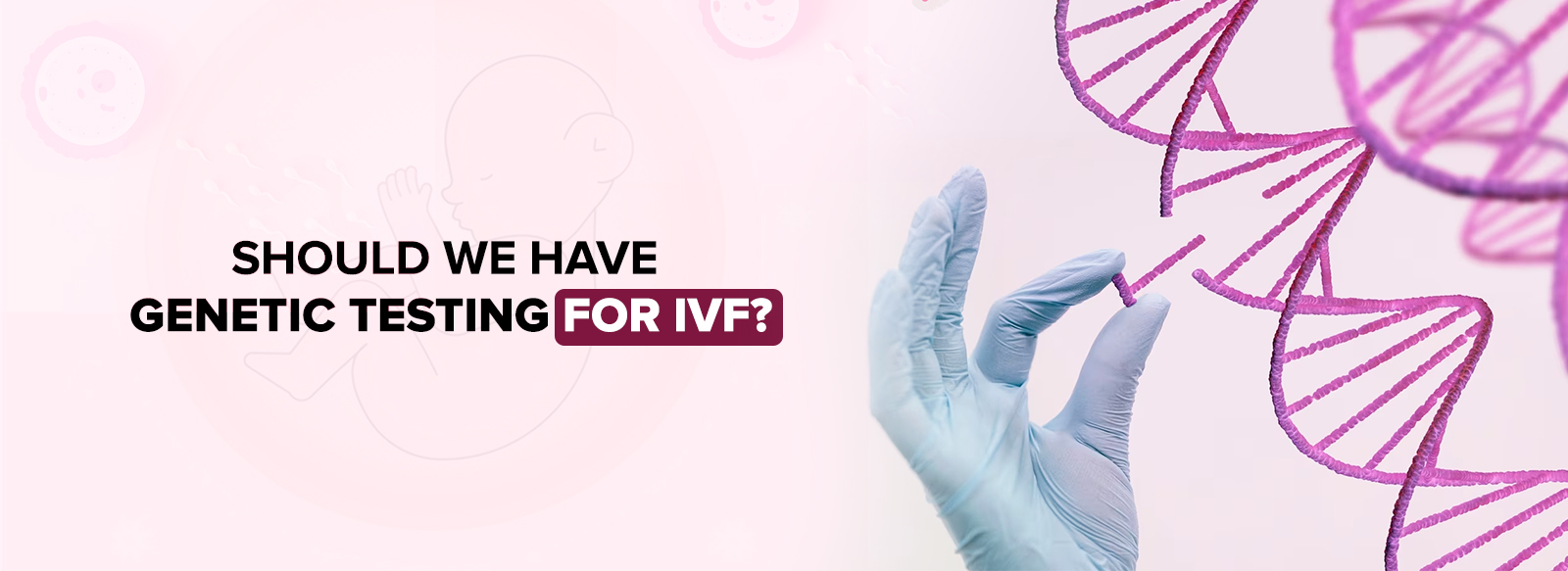If you want to be a parent but are having difficulty getting pregnant, in-vitro fertilisation (IVF) is answer. IVF has a success rate of more than 80%, but additional considerations are required to increase the number of chances of conception. Genetic testing is one of the methods used by your IVF specialist to predict the presence of any defects or abnormalities in embryos that may cause certain disorders. So, should we do genetic testing for IVF? The answer is yes. Genetic testing (PGS or PGD) provides valuable information about embryos, assisting in the identification of potential genetic disorders or chromosomal abnormalities. This information can be used to select embryos that are less likely to have genetic conditions, potentially increasing the chances of a successful pregnancy and a healthy baby.
The important key here is that although genetic screening is advised most of the time, it might be a personal choice for the parents. It’s not mandatory for IVF candidates to undergo genetic screening based on their circumstances and preferences. If your personal beliefs, ethical considerations, or financial constraints allow for it, you should still consult with your IVF specialist first before making a decision.
Types of genetic testing for patients undergoing to IVF:
Preimplantation genetic testing (PGT) is used to detect chromosomal abnormalities in embryos created through IVF before pregnancy. There are two different types of genetic testing methods which are commonly used at fertility hospitals and IVF clinics–
- Preimplantation genetic screening (PGS),
- Preimplantation genetic diagnosis (PGD).
The preimplantation genetic screening (PGS) approach, also known as PGT-A, is useful for determining the number of chromosomes in an embryo, which is 24 pairs in healthy conditions.
On the other side, preimplantation genetic diagnosis (PGD), referred to as PGT-M, is used to test for a specific genetic disorder. There are 50% chances for a child to inherit a genetic disorder from one or both of their parents.
Is genetic testing for IVF worth it?
PGT testing is done before embryo transfer but after 5 to 6 days of embryo development processes. Is genetic testing worth it in IVF? Yes, it is recommended but not required and may vary depending on individual circumstances and preferences. Here are the benefits and drawbacks of preimplantation genetic testing to help you decide whether it is worth it or not.
Pros of Preimplantation Genetic Testing (PGT):
- Risk Reduction: Identifies embryos with genetic abnormalities, reducing the risk of passing on inherited disorders to the child.
- Increased Pregnancy Success: Helps select embryos with higher chances of successful implantation, leading to increased pregnancy rates.
- Reduced Miscarriage Risk: Lower likelihood of miscarriage, specifically for women over 35, as a result of selecting embryos less prone to chromosomal abnormalities.
- Time and Cost Efficiency: This can potentially reduce the number of IVF cycles needed by selecting healthier embryos, saving time and costs.
Cons of Preimplantation Genetic Testing (PGT):
- False Positives/Negatives: This is not infallible, and there is a small chance of false positives or negatives, leading to a potential misinterpretation of genetic information. However, the accuracy is highlighted at 98% in a survey.
- Invasive Procedure: Involves the removal of cells from the embryo; in such a process, embryos may not survive the biopsy procedure.
- Limited Scope: It may not detect all genetic abnormalities, and it primarily focuses on the specific conditions targeted during testing.
What is the success rate of IVF after genetic testing?
In general, the success rate of IVF (live birth) after genetic testing is 65%, and it can go up to 95% after three life cycles. However, it can vary based on several factors, including the age and the overall health of the woman. Mostly, preimplantation testing is done to detect any potential abnormalities in the baby for a higher live birth success rate. But genetic testing is not the only factor that influences the success rate of an IVF pregnancy. But also factors like medical history, age, and other relevant factors. So, we recommend you consult with a fertility doctor from a top IVF centre.
Conclusion:
In summary, yes, you should have genetic testing. It can be either PGT-A or PGT-M. However, it’s not mandatory for couples undergoing IVF and can depend on individual choices. The genetic testing is done after almost a week of blastocyst culture but before embryo implantation in the uterus. In general, these tests have high accuracy, but the final result can be different in some cases. So, it is important to consult with your IVF specialist before making any decision. Additionally, genetic testing can determine a baby’s gender. As we have seen in the past, people in India prefer boys over girls; it is your responsibility as a parent not to reveal details about your baby in the womb, whether it is a girl or a boy, until the newborn comes to the real world.
Looking for IVF consultation at the best fertility hospital in Punjab? Vradaan Medical Centre is the leading IVF clinic in Northern India, with locations in Jalandhar, Amritsar, and Srinagar. The fertility clinic has an IVF success rate of 85% and has made 30,000+ families happy with their kids. It’s your turn to find a pregnancy solution. Book a free consultation at +91 9814021991.


